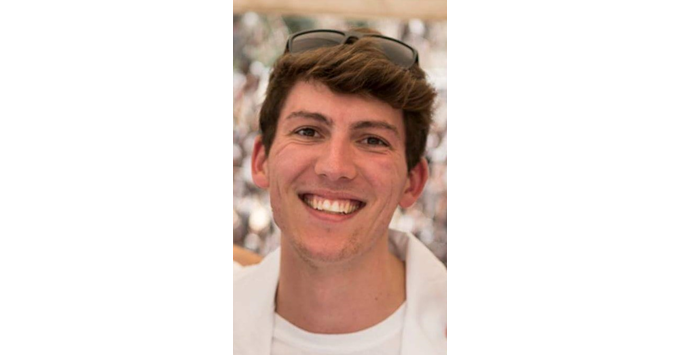Harrison Barnett

“I really like the idea of being able to teach other people,” explains Harrison Barnett, a first year PhD student who has recently been appointed as one of three new teaching fellows at the Research School of Chemistry. “One of the reasons I started with chemistry is that I had really good chemistry teachers in high school, and that made me like the subject a lot more.”
“When you're in the lab as an undergraduate student,” Harrison continues “having a good demonstrator can make everything easier. I want to be that person that can do that for students coming through. I know how scary it can be being in a lab situation that you're unaware of, so I want to be a person there that can help others negotiate that situation.”
After finishing high school Harrison, who was born and bred in Canberra, took six months off to study Mandarin at Shanghai University, before coming back to his home town to complete a Bachelor of Advanced Science with Honours at the ANU. He is now pursuing similar research from his Honours in his PhD.
“I'm working in organometallics,” Harrison explains. “We're working on trying to build bridges out of carbon atoms between metals, and trying to figure out if they [the metals] can talk to each other and how the bridge affects that.
“Last year in my Honours we were able to make a couple of these bridges. It was by accident, but that's how chemistry works. Now we want to make a decent number of them. We've got the basis on how to get there, now it's expanding the field. We've got the starting compound, what can we do to it? That's my goal at the moment this year.”
Harrison says that he’s finding this research interesting for a number of reasons.
“One of the reasons that we’re doing this is that no one's really done it before, so it's a really underexplored field. No one's made these bridges and no one's tested them, so it's a huge opportunity to do something new.
“But there are also a range of potential applications. The big one is in molecular transistors. All transistor devices in phones and other electronics are made up of multiple molecules, which are quite large systems. There's a limit therefore on how small we can make them, because of the technology we have. Through these bridges however, we have the potential to make a transistor go from being many, many atoms to a single molecule. You could shrink down the entire size of all the microchips and you could have smaller, faster processes.”
Throughout all of his time at the ANU teaching has been a driving force for Harrison.
“I was lucky enough to start my lab-based teaching in my first year of University, teaching high school outreach. I then did peer-assisted learning in second year, running some tutorials in third year and honours, and lab work all the way through.
“I have continued this through my PhD. The last year has been quite heavily based on running lab courses for all the groups from first year up to third year courses, and I've been running tutorials all along the first year courses as well.”
With this experience under his belt Harrison decided to apply for one of the school’s three teaching fellowship positions. The fellowship provides PhD students with a more formalised teaching role, giving a guarantee of at least 120 hours of teaching per year, and opportunities to take on leadership positions.
“It was a matter of looking at what the fellowship did,” Harrison explains. “I checked all the boxes with what I’d been doing anyway. So it was a more formal way of recognizing that work. I like the idea of having a more consistent job in terms of teaching and getting the opportunity to run lectures to the bridging courses at the end of each year.
“It’s a more formal recognition of the work that we can do. I will be a step up in terms of the responsibility and the status that I have with the job.”
Most of all however it gives Harrison the opportunity to do one of the things he loves the most.
“I enjoy teaching. It’s really nice being able to encourage students to get through classes. In chemistry we have a high number of students drop off each year, because the courses can be really difficult. To be able to keep students excited about chemistry, and to stay in it, it obviously helps them but also the department in the long run.
“Being able to teach that through the PhD is obviously a goal that I'd like to keep up. Post that, whether that's formally teaching or as an informal thing, I'm still not sure yet. But they're just potentials I'm going to be looking into.”
